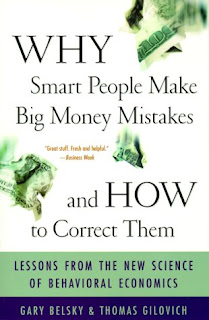
My latest finance book has been Why Smart People Make Big Money Mistakes and How to Correct Them, by Gary Belsky & Thomas Gilovich
They cover quite a bit of good material in their book, so I’ll be focusing on one area at a time to reflect on my thoughts. They look at the behavior behind economics, which is an interesting approach to your average finance book.
I was interested in their analysis of how people tend to mentally manage different pots of money in their head. For instance, you put you tax return in one pot and your salary in another. Some money is seen as fun money, and other as untouchable. They give several examples of why this isn’t the best way to think of money. By stepping back and thinking of all money as the same, you are less likely to blow money on something just because you feel you have some extra fun money.
Their suggestion was to put any extra money into an account for three months and then decide what to do with it. Their idea is that once it has been in your account for a few months you’ll be more attached to it there, and won’t feel as apt to go out and blow it. I’d have to say that I think they are on to something. When I started reading this book in May (I’ve been in grad school with a lot of other reading), I had a tax return and some other money in my account. It was true, that the longer it sat there the less I wanted to spend it. In the end I invested part in an index fund and part in my Roth IRA.
Another example of a similar situation is how people might bend over backwards to save a little money on one place, but when making a larger purchase you might not go across the street for that same dollar value in savings. Both amounts of money are the same in the end, no matter which way you get it.
Lastly they look at times when you are less likely to sell something you hold value to, even if you are better off selling. This might be the case for a house or an inheritance you keep in the bank just because you don’t want to risk losing it.
The basic idea is to consider how you mentally account for money. Feel free to leave a comment and let us know how might mentally manage money.
Cheers,
Miel


No Comments yet!